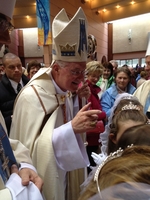Cardinal Robert Sarah, President of the Pontifical Council 'Cor Unum', has concelebrated mass at today's International Eucharistic Congress in the main RDS arena.
Cardinal Sarah coordinates the work of development and aid groups like Trócaire and Caritas. His homily emphasized the personal, national and global challenges facing the world.
Dubliner Anna Williams, one of the 1,700 volunteers at the Congress, recalled how happy an occasion the week of activities and prayer had been.
She said pilgrims, herself included, recognized they were broken people and in need of God's forgiveness.
Many had met childhood friends for the first time in many years, she said.
Giving one of the day's testimonies in the main arena, the Vice President of the Society of St Vincent de Paul in Ireland spelt out the implications of Jesus' command to love God and one another.
Professor John Monaghan said that "these two great intertwined and inseparable commandments indicate that we cannot say we love God if we do not simultaneously love our neighbor in a very tangible way, in other words through showing solidarity.
Consequently," he added " in loving God we are all expected to look beyond our own personal needs, spiritual and worldly, and actively reach out to our neighbour, whoever and wherever they might be."
The author and Abbot of Glenstal in Co Limerick told hundreds of pilgrims packed into one of the main conference halls that James Joyce had attended mass every year on his birthday, 2 February, the feast-day of the Presentation of Jesus in the Temple.
Abbot Mark Patrick Hederman said that Joyce left Ireland as a young man condemned and penniless.
But he said it was not only the Catholic Church which had condemned him.
He explained that Professor John Mahaffy, the Provost of the then largely Protestant Trinity College, had said 'Ulysses' was living proof that a university (meaning the Catholic University, later University College Dublin) should never have been established for the "guttersnipes of Ireland".
Turning to a more recent controversy, he said that 50 years ago the Second Vatican Council had quickly divided into a large majority of very progressive participants and a small minority of conservatives.
But he said that, unfortunately, after it ended, the progressives from the church outside Rome realized that "they had played the match away from home" and that when they returned to their own dioceses the conservatives back in the Vatican had begun changing things.
Meanwhile, Papal Legate Cardinal Marc Ouellet visited the Marian Shrine at Knock and was the main celebrant at mass in the Basilica.
Concelebrants included the Apostolic Nuncio, Archbishop Charles Brown, the Archbishop of Tuam and custodian of the Marian Shrine, Archbishop Michael Neary and Knock parish priest Fr Richard Gibbons, Parish Priest of Knock along with 70 priests from the Archdiocese of Tuam and surrounding dioceses.
In his homily, Cardinal Ouellet said Pope Benedict wanted him, as Papal Legate, to extend his special apostolic blessing for Ireland.
He said the Pope had asked him to come to the Shrine at Knock "so that you may know of his special care for you and of his daily prayer that you and all the people of Ireland may know the Lord's peace, consolation and comfort".

